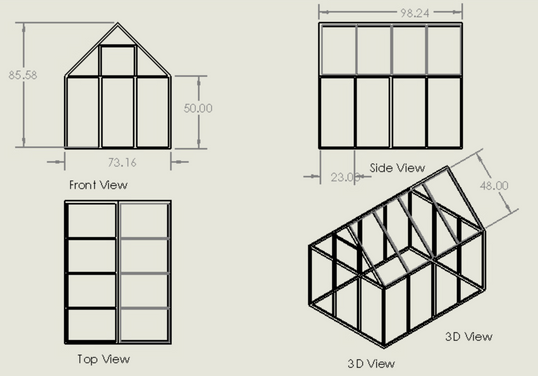

Inspiring future generations to grow sustainably.
OUR PROJECT
We are collaborating with the Biological and Agricultural Engineering department at UC Davis to develop a smart greenhouse that will be used to educate students on sustainable indoor farming. Our goal is to design, build, and test a greenhouse that is electrically off-grid, utilizes an aeroponic grow system, and could autonomously control its grow environment. This greenhouse will be housed on the university campus, with the intent of providing a long-term experiential learning space for future students.
01 / ENERGY EFFICIENT
With the use of a photovoltaic system we plan to be electrically off-grid. We emphasizes on the use of renewable energy sources, because they provide clean energy for our daily lives without the negative byproducts of traditional energy (such as CO2 emissions).
02 / WATER
EFFICIENT
The plant production system consists of an aeroponics systems made up of polyvinyl chloride piping. Aeroponics is the process of growing plants in a soilless medium typically consisting of a mist environment. This method of growing plants allows us to recycle our grow medium for 2 weeks.
03 /AUTONOMOUSLY CONTROLLED
To maintain the perfect environment inside the greenhouse, we will be using a small space heater and a cooling fan by the small opening of the greenhouse. We will connect sensors to these heating/cooling elements in order to maintain the perfect environment for the plants.
*Hover over the image for more detail*
MODELING

Thermal Modeling
The thermal modeling of the greenhouse involved assessing the passive heating and cooling of the greenhouse to gain better insight into what the photovoltaic system would require. Performance of the thermal mass and interior temperature of the greenhouse was estimated over varying outside air temperature using CIMIS data for one year.

Power Modeling
We estimated power demand and usage required to run our project. We considered both off-grid DC or AC system. The benefits of a DC system is that it is simpler and easier to install and it charges the battery more efficiently. While an AC system will allow for higher voltage devices to be powered and it generates less heat using a solar inverter.

Irrigation Modeling
We attempted to model the pressure loss of the water from the pump to the end of the nozzles. We learned about many different modeling strategies, but the one we used was the Equivalent Length Method. This method allows us to describe pressure drop through a PVC component as the pressure drop through a length of a pipe.
COVID-19
MEET THE TEAM
Ayan Behjat
BS. Biological Systems Engineering
Born and raised in Abu Dhabi, United Arab Emirates, the barren landscape and lack of diversity in my earliest ecosystem sparked my interest in the field of biological sciences and engineering. Ever since, my passion for plants grew and I promised to dedicate my professional career to advancing the agricultural sector through research and innovation. I am dedicated to this project, because I believe indoor farming is the future of food and I want to inspire future generations to practice sustainable indoor agriculture.

Rylie Siegfried
BS. Biological Systems Engineering
While attending one of the most sustainable universities in the world, sustainability has become a leading force in what I revolve my work around. My primary passion is climate change mitigation and environmental protection, and how practices like indoor farming can be the solutions to these relevant problems. Through this project, I hope to educate and inspire others to see indoor farming as a way to create a sustainable world.

Taylor Charlesworth
BS. Biological Systems Engineering
Taylor grew up in the San Francisco East Bay area. She knew early on that engineering was her passion and coupled with her love of biology led her to pursue her degree in biological systems engineering. While in college, she realized her green-thumb and this pushed her to dedicate herself to this Smart Greenhouse project. Furthermore, the idea of creating a useful space for future engineering students at UC Davis sounded like an impactful project to promote education of indoor farming.
GET IN TOUCH
Rylie Siegfried
Ayan Behjat
Taylor Charlesworth




























